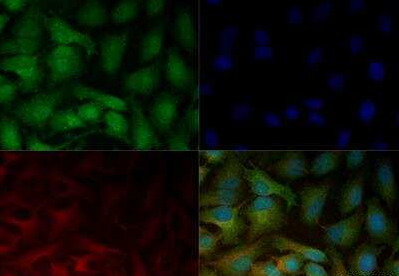LOX Rabbit Polyclonal Antibody
Frequently bought together (3)
beta Actin Mouse Monoclonal Antibody, Clone OTI1, Loading Control
USD 200.00
Other products for "LOX"
Specifications
| Product Data | |
| Applications | ICC/IF, IHC, IP, WB |
| Recommended Dilution | Immunohistochemistry, Knockout Validated, Immunocytochemistry/ Immunofluorescence: 1:10-1:500, Immunoprecipitation: 1:10-1:500, Western Blot: 1:100-1:2000, Immunohistochemistry-Paraffin: 1:10-1:500, Immunohistochemistry-Frozen |
| Reactivities | Human, Mouse, Rat, Bovine, Primate |
| Host | Rabbit |
| Clonality | Polyclonal |
| Immunogen | Within the range of amino acids 305-338 of human LOX protein were used as the immunogen. |
| Formulation | Crude whole Rabbit sera with 50% Glycerol, 0.025% Sodium Azide |
| Concentration | lot specific |
| Purification | Whole antisera |
| Conjugation | Unconjugated |
| Storage | Store at -20°C as received. |
| Stability | Stable for 12 months from date of receipt. |
| Gene Name | lysyl oxidase |
| Database Link | |
| Background | LOX (lysyl oxidase) is a copper-dependent amine oxidase enzyme responsible for post-translational oxidative deamination of peptidyl lysine residues in precursors to fibrous collagen and elastin. LOX is synthesized as an inactive 50 kD proenzyme that is N-glycosylated in ER/Golgi complex and then secreted into extracellular environment, where it is processed by pro-collagen C-proteinases (mammalian Tolloids and BMP-1) into an active enzyme (28-32 kD) and an 18 kD propeptide (LOX-PP) which can be N-glycosylated intracellularly into a ~35 kD form. LOX activity is critical in maintaining the tensile as well as elastic features of the connective tissues of skeletal, pulmonary and cardiovascular systems. LOX deficiency leads to intra-gestational lethality in LOX-/- mice wherein the pups exhibits aortic aneurysms/tortuosity/rupture. LOX expression is highly regulated during normal development; and, its aberrant expression or activity has been documented in a range of diseases predominantly associated with the ECM such as Cutis laxa or OHS (occipital horn syndrome), Menkes' syndrome, myocardial ischaemia/heart failure, atherosclerosis, scleroderma, liver cirrhosis, Pseudoexfoliation syndrome and glaucoma, Alzheimer's/non-Alzheimer's dementia, Wilson's disease, primary biliary cirrhosis as well as in many type of cancers, wherein LOX implicates in promoting tumor cell invasion and metastasis. |
| Synonyms | MGC105112 |
| Reference Data | |
| Protein Families | Druggable Genome, Secreted Protein |
Documents
| Product Manuals |
| FAQs |
| SDS |
{0} Product Review(s)
0 Product Review(s)
Submit review
Be the first one to submit a review
Product Citations
*Delivery time may vary from web posted schedule. Occasional delays may occur due to unforeseen
complexities in the preparation of your product. International customers may expect an additional 1-2 weeks
in shipping.






























































































































































































































































 Germany
Germany
 Japan
Japan
 United Kingdom
United Kingdom
 China
China






